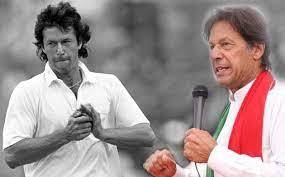
In by the far the best biography on Imran Khan to date, Ivo Tennant starts his book, conveniently titled ‘Imran Khan’, with a familiar theme of the man’s aura and his chiseled features resembling that of a Greek god, and that too with the blessing of an Indo-European aquiline nose, amongst other similar physical attributes. As it was common practice with writers and columnists in the 1990s, especially after the 1992 world cup win, Imran was often described as a godlike figure with the mystique usually associated with a subcontinental or, at best, a flawless, exotic deity.
His own columns in British newspapers like the Daily Telegraph during those days, thrived on that almost supernatural image and a carefully built post-retirement persona which refused to fade away. In those write ups he frequently attributed his cricket victories to religion and ‘spiritualism’ and made it clear that his approach and work ethos could also be fruitful if employed in other walks of life, such was the relentless barrage of sermonising the world had to endure. The world bought this half-baked and open-ended pep-talk as the manifesto to success in completely unrelated fields such as philanthropy and politics. The rest, as they say, is history.
Quite ironically and, in some people’s opinion, quite hypocritically, Imran never flinched when he criticised former cricketers for milking their cricketing careers even after retirement. His abhorrence for such a leech-like approach was quietly admired and, unsurprisingly, never got challenged publicly, again, due to his aura. But in reality another field of activity had been carved out for him; being a TV analyst looked too small in comparison.
Few people knew at the time that he drew his strength from his admirers and backers in the military establishment who had taken him on as their new ‘apprentice’ to replace the conventional and generally ‘corrupt’ politicians. Perennially disdainful and distrustful of the indigenous corrupt and dishonest politician, a sentiment the military had inherited from its colonial past for supremacist/racist reasons, the idea of an ‘untainted and squeaky clean’ person from another world had considerably warmed up their hopes and expectations.
Instead of frightening the generals into abandoning such an audacious idea altogether for lack of compatibility and indeed its unworkability, it paradoxically attracted them so much that work was started in earnest to forge him into a politician. Perhaps an equivalence can be drawn with some of the disastrous military operations in the past, Operations Gibraltar and Kargil come to mind.
The irony is not lost on the country when the responsibility to teach him the art and science of politics rested on the shoulders of a few generals. It did not alarm anyone that, as per his own admission, Imran was the same person who preferred to attend political meets hosted by Benazir Bhutto at Oxford because the food served on those occasions attracted him more than the political debate and discourse on offer!
In cricket, he had owed his phenomenal rise to a position of privilege which he and most of his cousins took for granted. Almost straight from Gymkhana cricket, which again was dominated by Zaman Park residents, the tranquil neighbourhood where he grew up, his selection for the national side in 1971 tour of England came as a big surprise even to his accomplished cousins. His team mates and rest of the country deemed it as a clear sign of nepotism practiced by a dominant cricketing elite which made sure brilliance and, in his case, even mediocrity in its close-knit community were capable of national selection. Majid Jahangir Khan, his mentor and a precociously talented older cousin calls Imran ‘an inswing bowler who got lucky’, a euphemism which not only sums up his sporting career but also throws light on his sheltered political journey.
Aftab Gul, a team member on the 1971 tour and now a senior lawyer, once told me over a cup of tea how Imran used to be the butt of their jokes on the tour for being dispensable or ‘sifarshi’, and how he used to lampoon his legendary appetite for food and milk. His subsequent exposure to Oxford and the county circuit, however, made sure he had learnt the art of war on the sports ground well enough to command a place in the national team.
A comparison between Imran Khan and Air Marshal Asghar Khan would not misplaced in terms of their lack of suitability for Pakistani politics, the former for imprudently and adamantly invoking sporting jargons while running a country and the latter for being tediously inflexible and for needlessly introducing the military stiffness into the chaotic and febrile life of a common man. It is quite ironical and would make an interesting case study that the generals who were either directly trained by British officers during colonial times or those in turn trained by the former understood abundant logic in refraining from imposing military work ethic of a garrison on civilian life. However, the patience was wearing thin and could not last forever, it seems.
In an era where hearts and minds are influenced and won by manufacturing narratives to remain relevant for different political forces even when chips are down, for how long can a society survive in the face of competing forces fiercely pulling in opposite directions? Just like he was undeservedly given a head-start in cricket, Imran from his prison cell must be thinking “Like sports, I can do it in politics even if I didn’t deserve it in 2018.” The question we must be asking ourselves is: are cricket and politics similar and can skills developed in one be successfully utilised in the other, and is Pakistani politics a perpetual playground of hubristic novices be they civilian or military?

